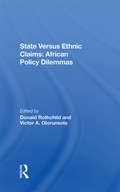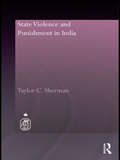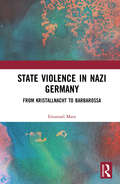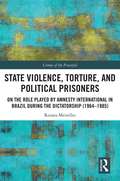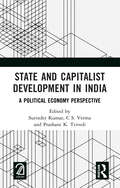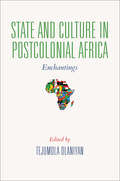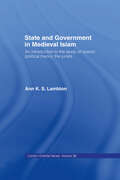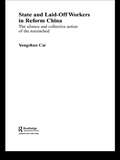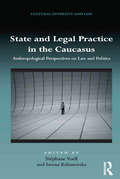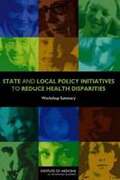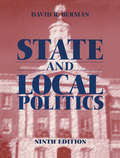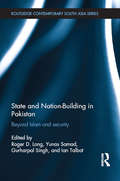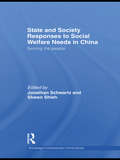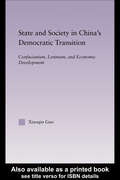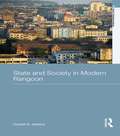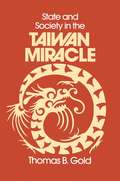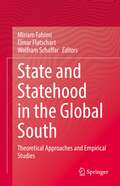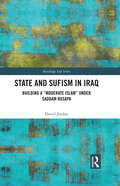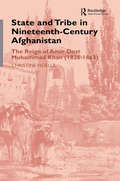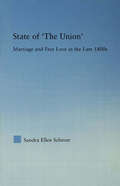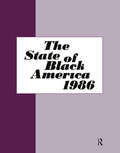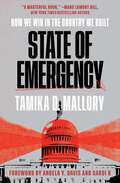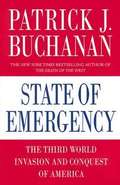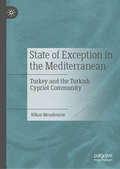- Table View
- List View
State Versus Ethnic Claims: African Policy Dilemmas
by Donald Rothchild Victor A OlorunsolaThe idea for this book can be traced to an informal brainstorming session among four very good friends -- Ali Mazrui, Victor Olorunsola, Donald Rothchild and Dunstan Wai. In a real sense, then, as editors we owe a lot to Dunstan and Ali for their intellectual stimulation and for encouraging us to pursue a follow-up to ~.f.2l.i::. ,lla .Qt Cultyral ~Natignalism .in A..f'.da
State Violence and Punishment in India (Royal Asiatic Society Books)
by Taylor C. ShermanExploring violent confrontation between the state and the population in colonial and postcolonial India, this book is both a study of the many techniques of colonial coercion and state violence and a cultural history of the different ways in which Indians imbued practices of punishment with their own meanings and reinterpreted acts of state violence in their own political campaigns. This work examines state violence from a historical perspective, expanding the study of punishment beyond the prison by investigating the interplay between imprisonment, corporal punishment, collective fines and state violence. It provides a fresh look at seminal events in the history of mid-twentieth century India, such as the massacre at Jallianwala Bagh, the non-cooperation and civil disobedience movements, the Quit India campaign, and the Hindu-Muslim riots of the 1930s and 1940s. The book extends its analysis into the postcolonial period by considering the ways in which partition and then the struggle against a communist insurgency reshaped practices of punishment and state violence in the first decade after independence. Ultimately, this research challenges prevailing conceptions of the nature of the state in colonial and postcolonial India, which have tended to assume that the state had the ambition and the ability to use the police, military and bureaucracy to dominate the population at will. It argues, on the contrary, that the state in twentieth-century India tended to be self-limiting, vulnerable, and replete with tensions. Relevant to those interested in contemporary India and the history of empire and decolonisation, this work provides a new framework for the study of state violence which will be invaluable to scholars of South Asian studies; violence, crime and punishment; and colonial and postcolonial history.
State Violence in Nazi Germany: From Kristallnacht to Barbarossa
by Emanuel MarxThrough analyses of three eventful years in Nazi Germany’s history – the Kristallnacht pogrom, the invasion of Poland and the invasion of Soviet Russia – this book explores the violence of states. All three events were part of the Nazi colonial project and led to mass killings, eventually resulting in the systematic murder of Jews becoming a major war aim – one that Germany would pursue to the end, even when it became clear that the military conflict could no longer be won. Drawing on voluminous historical and sociological literature, as well as documentary and contemporary evidence, the author presents a new account of the phenomenon of extreme state violence as a special category of violence, in which the armed forces, maintained in a state of readiness, are used unnecessarily and excessively, often on thin pretexts, and, unlike coercive violence, only rarely for the purposes of carrying messages to the public. As such, it will appeal to scholars of sociology, history and anthropology concerned with mass and state violence.
State Violence, Torture, and Political Prisoners: On the Role Played by Amnesty International in Brazil During the Dictatorship (1964–1985) (Crimes of the Powerful)
by Renata MeirellesState Violence, Torture, and Political Prisoners discusses the activities of Amnesty International during the period of Brazil’s dictatorship (1964–1985). During the dictatorship, Amnesty assisted political prisoners who were submitted to torture and helped to publicise charges of torture against agents of the military regime’s repressive apparatus. Through a specific examination of Amnesty’s work with Brazilian political prisoners, this book explores how Amnesty adapted its organisational principles – such as non-violence and the focus on individual cases – during this time. In 1967 Amnesty experienced a severe internal crisis which prompted the organisation to make structural changes. These changes enabled it to expand its activities beyond Europe to Latin America, including Brazil. This book examines one of Amnesty International’s first major campaigns against torture and the impact this had on the organisation’s development of a new agenda. Bringing a critical and historical perspective on Amnesty’s work, the book contributes to the debate on the role of human rights organisations in addressing human rights abuses worldwide. It makes a significant contribution to international research on state crime, human rights, and torture.
State Work: Public Administration and Mass Intellectuality
by Stefano HarneyAn innovative contribution to political theory, State Work examines the labor of government workers in North America. Arguing that this work needs to be theorized precisely because it is vital to the creation and persistence of the state, Stefano Harney draws on thinking from public administration and organizational sociology, as well as poststructuralist theory and performance studies, to launch a cultural studies of the state. Countering conceptions of the government and its employees as remote and inflexible, Harney uses the theory of mass intellectuality developed by Italian worker-theorists to illuminate the potential for genuine political progress inherent within state work. State Work begins with an ethnographic account of Harney's work as a midlevel manager within an Ontario government initiative charged with leading the province's efforts to combat racism. Through readings of material such as The X-Files and Law & Order, Harney then reviews how popular images of the state and government labor are formed within American culture and how these ideas shape everyday life. He highlights the mutually dependent roles played in state work by the citizenry and civil servants. Using as case studies Al Gore's National Partnership for Reinventing Government and a community-policing project in New York City, Harney also critiques public management literature and performance measurement theories. He concludes his study with a look at the motivations of state workers.
State and Capitalist Development in India: A Political Economy Perspective
by Prashant K. Trivedi Surinder Kumar C. S. VermaThis book seeks to encourage dialectical methods through the interaction of economic, political and social factors to approach social analysis. It examines various emerging issues in society in the era of globalization. The issues raised in the critique will benefit scholars in comprehending social reality with a new perspective and approach. This book will help policymakers look at more realistic conclusions for policy making. This title is co-published with Aakar Books. Print editions not for sale in South Asia (India, Sri Lanka, Nepal, Bangladesh, Pakistan and Bhutan)
State and Culture in Postcolonial Africa: Enchantings (African Expressive Cultures)
by Tejumola OlaniyanHow has the state impacted culture and cultural production in Africa? How has culture challenged and transformed the state and our understandings of its nature, functions, and legitimacy? Compelled by complex realities on the ground as well as interdisciplinary scholarly debates on the state-culture dynamic, senior scholars and emerging voices examine the intersections of the state, culture, and politics in postcolonial Africa in this lively and wide-ranging volume. The coverage here is continental and topics include literature, politics, philosophy, music, religion, theatre, film, television, sports, child trafficking, journalism, city planning, and architecture. Together, the essays provide an energetic and nuanced portrait of the cultural forms of politics and the political forms of culture in contemporary Africa.
State and Government in Medieval Islam
by Ann K. LambtonFirst published in 2004. Routledge is an imprint of Taylor & Francis, an informa company.
State and Laid-Off Workers in Reform China: The Silence and Collective Action of the Retrenched (Routledge Studies on China in Transition)
by Yongshun CaiIn the 1990s, the Chinese government launched an unprecedented reform of state enterprises, putting tens of millions of people out of work. This empirically rich study calls on comprehensive surveys and interviews, combining quantitative data with qualitative in its examination of the variation in workers' collective action. Cai investigates the difference in interests of and options available to workers that reduce their solidarity, as well as the obstacles that prevent their coordination. In addition, and perhaps more importantly, this book explores the Chinese Government’s policies and how their feedback shaped workers’ incentives and capacity of action.
State and Legal Practice in the Caucasus: Anthropological Perspectives on Law and Politics (Cultural Diversity and Law)
by Stéphane Voell Iwona KaliszewskaLegal pluralism and the experience of the state in the Caucasus are at the centre of this edited volume. This is a region affected by a multitude of legal orders and the book describes social action and governance in the light of this, and considers how conceptions of order are enforced, used, followed and staged in social networks and legal practice. Principally, how is the state perceived and how does it perform in both the North and South Caucasus? From elections in Dagestan and Armenia to uses of traditional law in Ingushetia and Georgia, from repression of journalism in Azerbaijan to the narrations of anti-corruption campaigns in Georgia - the text reflects the multifarious uses and performances of law and order. The collection includes approaches from different scholarly traditions and their respective theoretical background and therefore forms a unique product of multinational encounters. The volume will be a valuable resource for legal and political anthropologists, ethnohistorians and researchers and academics working in the areas of post-socialism and post-colonialism.
State and Local Policy Initiatives to Reduce Health Disparities: Workshop Summary
by Karen M. AndersonAlthough efforts to reduce health disparities receive attention at the national level, information on the successes of state and local efforts are often not heard. On May 11, 2009, the Institute of Medicine held a public workshop to discuss the role of state and local policy initiatives to reduce health disparities. The workshop brought together stakeholders to learn more about what works in reducing health disparities and ways to focus on localized efforts when working to reduce health disparities.
State and Local Politics: Autonomy, Politics, And Policy
by David BermanPolitics at the state and local level has never been more interesting than in our "devolutionary" age. This popular text is the most concise, readable, and current introduction to the field. Now in its ninth edition, the book keeps its focus on the varied and changing political and economic environments in which state and local governments function, and their strengths and weaknesses in key areas of public policy. The text is enlivened by boxed sections that relate individual experiences or highlight particular issues and developments. Topics covered in this edition include the drive toward devolution in the federal system; fiscal constraints; political accountability; affirmative action; majority-minority districts; and changing approaches to welfare, education, land use, and law enforcement.
State and Nation-Building in Pakistan: Beyond Islam and Security (Routledge Contemporary South Asia Series)
by Ian Talbot Roger D. Long Gurharpal Singh Yunas SamadReligion, violence, and ethnicity are all intertwined in the history of Pakistan. The entrenchment of landed interests, operationalized through violence, ethnic identity, and power through successive regimes has created a system of ‘authoritarian clientalism.’ This book offers comparative, historicist, and multidisciplinary views on the role of identity politics in the development of Pakistan. Bringing together perspectives on the dynamics of state-building, the book provides insights into contemporary processes of national contestation which are crucially affected by their treatment in the world media, and by the reactions they elicit within an increasingly globalised polity. It investigates the resilience of landed elites to political and social change, and, in the years after partition, looks at the impact on land holdings of population transfer. It goes on to discuss religious identities and their role in both the construction of national identity and in the development of sectarianism. The book highlights how ethnicity and identity politics are an enduring marker in Pakistani politics, and why they are increasingly powerful and influential. An insightful collection on a range of perspectives on the dynamics of identity politics and the nation-state, this book on Pakistan will be a useful contribution to South Asian Politics, South Asian History, and Islamic Studies.
State and Society Responses to Social Welfare Needs in China: Serving the people (Routledge Contemporary China Series)
by Jonathan Schwartz Shawn ShiehThis volume examines the shifting role of the state and social organizations (e.g. NGOs) in providing social services in contemporary China. A series of case studies identifies a dynamic whereby the state increasingly withdraws from social service provision with social organizations taking up the slack. An interdisciplinary line up of contributors explore this dynamic, and how it affects the state-society relationship and the quality of social services provided. Based on current research, this book engages existing debates over state-society relations offering a new thematic framework to evaluate this relationship. Drawing on the framework, each chapter explores a particular aspect of social service provision including orphan care, migrant labor protection and infectious disease control. Differentiating between case studies of crisis and non-crisis social service provision situations, this volume argues that state and social organizations engage in ongoing negotiations to achieve shared social service provision goals – a dynamic largely controlled by the state. However during crises, the controlled relationship may alter as the priority becomes addressing the immediate demand for essential social services. The result is the potential for a rapid change in relations between the state and social organizations.
State and Society in China's Democratic Transition: Confucianism, Leninism, and Economic Development
by Xiaoqin GuoThis study aims to fill the gap in the existing literature on China's Democratic development, by presenting a comprehensive and detailed examination of the key factors that have created and sustained state domination over society in China.
State and Society in Modern Rangoon (Asia's Transformations)
by Donald M. SeekinsWhile most of Asia’s major cities are increasingly homogenized by rapid economic growth and cultural globalization, Rangoon, which is Burma’s former capital and largest city, still bears the imprint of a unique and often turbulent history. It is the site of the Shwedagon Pagoda, a focus of Buddhist pilgrimage and devotion since the early second millennium C.E. that continues to play a major role in national life. In 1852, the British occupied Rangoon and made it their colonial capital, building a modern port and administrative center based on western designs. It became the capital of independent Burma in 1948, but in 2005 the State Peace and Development Council military junta established a new, heavily fortified capital at Naypyidaw, 320 kilometers north of the old capital. A major motive for the capital relocation was the regime’s desire to put distance between itself and Rangoon’s historically restive population. Reacting to the huge anti-government demonstrations of "Democracy Summer" in 1988, the new military regime used massive violence to pacify the city and sought to transform it in line with its supreme goal of state security. However, the "Saffron Revolution" of September 2007 showed that Rangoon’s traditions of resistance reaching back to the colonial era are still very much alive.
State and Society in the Taiwan Miracle (Taiwan In The Modern World Ser.)
by Thomas B. GoldExplores the application of constructivist theory to international relations. The text examines the relevance of constructivism for empirical research, focusing on some of the key issues of contemporary international politics: ethnic and national identity; gender; and political economy.
State and Statehood in the Global South: Theoretical Approaches and Empirical Studies
by Miriam Fahimi Elmar Flatschart Wolfram SchaffarThis book focuses on critical approaches to the state and state theory in the Global South. In light of the reemergence of the post-colonial and peripheral state as a crucial institution and actor in the 21st century’s capitalist world-system, the book examines the nature, functions and development dynamics of the state in the periphery, as well as its constituting interests and struggles. Drawing on the works of Poulantzas and Gramsci, dependency and world-systems theory, as well as the regulation school and the German Ableitungsdebatte, stategraphy and critical realism, it analyzes the development of different theoretical perspectives on the state, elaborates on their theoretical, ontological and epistemological presuppositions, and illustrates their methodological, practical and ethical implications. The book is divided into three parts, the first of which provides an overview of recent global capitalist developments and challenges for state theory and lays the theoretical, ontological and hermeneutic foundation for studies of the state and statehood in the Global South. In turn, the second part introduces readers to different schools of state theory, including critical theory and materialism, as well as approaches derived from postcolonial, anthropological, and feminist thought. Lastly, the third part presents various empirical studies, highlighting concrete methodological and practical experiences of conducting critical state theory.
State and Sufism in Iraq: Building a “Moderate Islam” Under Saddam Husayn (Routledge Sufi Series)
by David JordanState and Sufism in Iraq is the first comprehensive study of the Iraqi Baʿth regime’s (r. 1968–2003) entanglement with Sufis and of Sunnī Sufi Islam in Iraq from the late Ottoman period until 2003 and beyond. For far too long, the secular and authoritarian Baʿth regime has been reduced to the dictator Saddam Husayn and portrayed as antireligious. It’s growing political employment of Islam during the 1990s, in turn, has been interpreted either as an abstract Baʿthist-nationalist Islam or as an ideological U-turn from secularism to a form of Islamism that ultimately contributed to the spread of Islamist terrorism after 2003. Broadening the narrow focus on Saddam Husayn, this book analyses other leading regime figures, their close entanglement with Sufis, and Baʿth religious politics of a state-sponsored revival of Sufi Islam and Iraq’s broad and distinct Sufi culture. It is the story of a secular regime’s search for "moderate" Islam in order to overcome the challenges of radical Islamism and sectarianism in Iraq. The book’s two-pronged interdisciplinary approach that deals equally with politics and Sufi Islam in Iraq makes it a valuable contribution to scholars and students in Islamic and Middle Eastern Studies, Religious Anthropology and Sociology, Political Science, and International Relations.
State and Tribe in Nineteenth-Century Afghanistan: The Reign of Amir Dost Muhammad Khan (1826-1863)
by Christine NoelleWith the exception of two short periods of direct British intervention during the Anglo-Afghan Wars of 1839-42 and 1878-80, the history of nineteenth-century Afghanistan has received little attention from western scholars. This study seeks to shift the focus of debate from the geostrategic concern with Afghanistan as the bone of contention between imperial Russian and British interests to a thorough investigation of the sociopolitical circumstances prevailing within the country. On the basis of unpublished British documents and works by Afghan historians, it lays the groundwork for a better understanding of the political mechanisms at work during the early Muhammadzai era by analysing them both from the viewpoint of the center and the pierphery.
State of 'The Union': Marriage and Free Love in the Late 1800s (Studies in American Popular History and Culture)
by Sandra SchroerThis study of the Free Love Movement in the mid-to-late 1800s examines the situated knowledge of women and men who participated in the movement, how they articulated the platform, and contributed to its exposure by writing and publishing their ideas, arguments and concerns. While all Free Love participants claimed benefits and freedoms from the practice, this book is the first to compare the benefits and political agendas experienced by the male participants with those experienced by the females. The importance of this work lies in its potential to inform current political resistance against the inequality inherent in legislation that strives to restrict sexual freedom in the United States, and its potential to contribute to the overall well-being of women, men and the society they live in.
State of Black America - 1986
by Bernard E. Anderson John CalmoreFirst published in 1986. A collection of studies on Black America from 1985 to 1986 inclsuing the economic status, classes, political policies, housing, education and civil rights. Includes a population chart of American Blacks from 1980 to 1984.
State of Emergency: How We Win in the Country We Built
by Tamika D. Mallory&“A masterful book…reaffirms the urgency of the current state of Black people in America and the power we all have to win transformative change.&” —Marc Lamont Hill, New York Times bestselling author &“Gives us the words and tools to fight for the justice our families deserve.&” —Tamika Palmer, mother of Breonna Taylor &“A powerful voice in consistently reminding us that we all have a stake in the fight for a just, fair, and equitable America.&” —Jada Pinkett Smith, actor, producer, entrepreneur Social justice leader Tamika D. Mallory states her case for action in this searing indictment of America&’s historical, deadly, and continuing assault on Black and brown lives.Drawn from a lifetime of frontline culture-shifting advocacy, organizing, and fighting for equal justice, State of Emergency makes Mallory&’s demand for change and shares the keys to effective activism both for those new to and long-committed to the defense of Black lives. From Minneapolis to Louisville, to Portland, Kenosha, and Washington, DC, America&’s reckoning with its unmet promises on race and class is at a boiling point not seen since the 1960s. While conversations around pathways to progress take place on social media and cable TV, history tells us that meaningful change only comes with radical legislation and boots-on-the-ground activism. Here, Mallory shares her unique personal experience building coalitions, speaking truth to power, and winning over hearts and minds in the struggle for shared prosperity and safety. Forward-looking, steeped in history, and rich with stories from life on the margins of American life, State of Emergency is a revelatory examination of the challenges we face, of the forces we must overcome, and a blueprint for all who maintain hope for social equity and a better tomorrow.
State of Emergency: The Third World Invasion and Conquest of America
by Patrick J. BuchananThe American Southwest is being detached linguistically, ethnically and culturally from the US by a deliberate policy of the Mexican regime.
State of Exception in the Mediterranean: Turkey and the Turkish Cypriot Community
by Nikos MoudourosThis book examines the evolution of the state of exception in which the Turkish Cypriot community has developed and how its relationship with Turkey has been transformed. It aims at a comprehensive understanding of the circumstances which led to the emergence of a Turkish Cypriot state of exception, as well as the procedures which led to the strengthening of resistance against its normalization. For a more comprehensive decoding of the aforementioned, this book studies the presence of Turkey in the everyday life of Turkish Cypriots in the framework of colonial politics. It examines in detail the transformation of the Cypriot space as it resulted from the pursuit for normalization of the state of exception. At the same time, however, this research underlines the ways in which the Turkish Cypriot opposition hinders the normalization of the state of exception through an alternative political program against the partition of Cyprus. The book aims to contribute to the broader academic research on states of exception and non-recognized state structures, through analyzing the ruptures caused in the hegemonic project. The research concerns the 1964–2004 period and is mainly, but not entirely, based on a large volume of primary sources.
